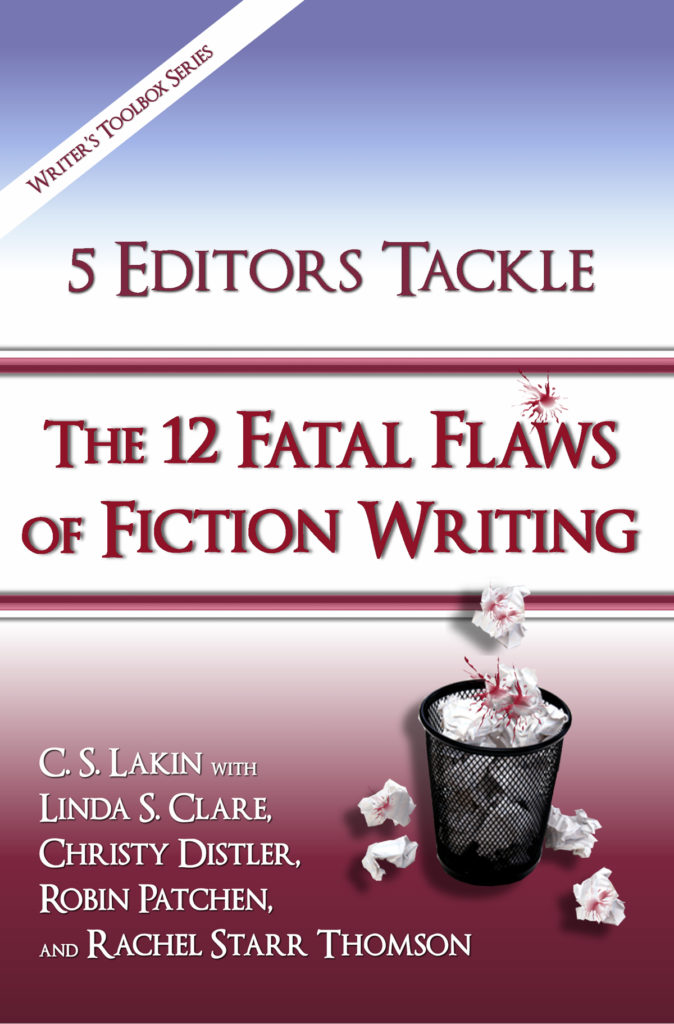12 Fatal Flaws Of Fiction Writing: Weak Construction
Author and former SpecFaith contributor Rachel Starr Thomson returns to showcase an excerpt from 12 Fatal Flaws of Fiction Writing. The new book–by authors C.S. Lakin, Linda S. Clare, Christy Distler, Robin Patchen, and Thomson–features more than 60 detailed before and after examples of flawed and corrected passages to help authors learn to spot flaws in their writing.
This Friday, Rachel returns to explore how fans and readers can best study the art of good writing.
Fatal Flaw of Fiction Writing #3: Weak Construction
Annie Dillard wrote that one who wants to be a writer should like sentences. In reality, I think, most of us write because we have stories to tell, but the love of words (and sentences, and paragraphs) must come into play, or else we would all be making movies instead of writing books.
Along the way we learn that not every sentence is created equal. That our words and how we string them together will give life to the stories we tell or drain them dry.
Fortunately, while natural talent and a good ear certainly help, good sentence writing is not some mystical skill that only the most devoted Jedi will ever attain. This fatal flaw is all about weak sentence construction—or, more specifically, how to avoid it.
To Be Inging, There Was Passive Vagueness
Okay, that nonsense subhead was fun to write. I admit it. Let’s watch its parts in action:
Before:
The ramshackle mansion was being built on a hilltop. In the trees birds were singing and the leaves were rustling under a sky that was sunny and clouds that were puffy and white. Nails were hammered sharply into boards while bricks were laid. It was a beautiful, pristine day. The work was coming along. Filling the air, the sounds of construction were encouraging. Laying aside his tool, he knew the workers were waiting for him.
After:
Garth stood on the hilltop, arms folded, gazing on the workers and the ramshackle mansion rising at their hands. The striking, churning, buzzing sounds of construction drowned out the songs of birds in the trees. Dark-skinned slaves hammered nails into boards and laid bricks one by one as the sun shone down on them from a pristine blue sky.
He set aside his hammer, encouraged by their progress. The workers awaited him.
The main problems of the Before paragraph can be broken down as follows:
- Overuse of “be” verbs (be, being, been, is, am, are, was, and were)
- Overuse of the past progressive (aka past continuous) tense—the “ing” verbs
- Overuse of the passive voice
- Vague descriptors
I use the word overuse when addressing these problems because “be” verbs, past progressive, and passive voice all have their place in our writing. Artists will use all shades, not only primary colors. But overuse—or just plain bad use—of any of these is death on vivid storytelling.
To Be or Not To Be
The eight forms of the verb “be”—otherwise known as state-of-being verbs—are useful, necessary little words without which English would hardly function. It’s a great mistake to try to excise them from our writing completely. (And contrary to legend, the use of a “be” verb does not automatically constitute passive voice.)
In storytelling, however, the state-of-being verbs can be a problem because they do just that: they state being. They do not show action. They do not move, act, or describe. They are just there. And nine times out of ten, they can be replaced by a stronger verb.
So rather than “She was at home,” you might try “She waited at home,” or “She stayed at home,” or “She twiddled her thumbs at home, wishing with all her might that she were somewhere else.” A “sky that was sunny” becomes “a sunny sky,” and “clouds that were puffy” become “puffy clouds.” “There was a man on the hill” becomes “A man stood on the hill.” Word count drops, rhythm improves, and images grow vivid.
The “be” verbs also act as helpers for past progressive verbs. Rather than simply stating that an action happened, a past progressive (or past continuous) verb traces its action—it shows that is “is happening.” So in the Before paragraph we see “was being,” “were singing,” “were rustling,” “was coming,” “were encouraging, “were waiting.”
At times you may want to stress the continuation of an action. In that case past progressive is fine. But normally, the simple past form of the verb will be more effective: sang, rustled, came, encouraged, waited. “Was being” is completely replaced by wording that shows the mansion being built.
The forms of “be” show up again in the use of passive voice. This is actually the biggest problem with the Before paragraph, far outweighing the others. Reading it, you might wonder, “Who the heck are these people? There’s no one in this scene!”
The mansion might be raised by phantoms for all we can see.
The ramshackle mansion was being built . . . by whom? Nails were hammered sharply into boards . . . by whom? Bricks were laid . . . by whom? Who was encouraged by the sounds of construction? Who lays aside his hammer? There isn’t a single actor in the whole paragraph; instead, every noun is acted upon. That is the difference between passive and active voice.
Passive Voice Does Have a Place
Even passive voice has its place in fiction. But active voice acts, and that makes it by far the stronger mode of construction. The After passage has people doing real things.
Which brings us, finally, to the problem of vagueness. Passive voice and state-of-being verbs contribute to making a scene vague. So does past progressive tense with its tendency to suggest that nothing is ever really finished or going anywhere definite.

Novelist and 12 Fatal Flaws of Fiction Writing coauthor Rachel Starr Thomson
The more general the wording, the less vivid it will be. The more concrete and specific, the more vivid. Specifics make a movie out of mud. In the After passage, therefore, we have Garth, a man with a name; we have dark-skinned slaves, a hammer, sounds that are not just “sounds of construction” but that buzz, scrape, churn, strike, and drown out other sounds.
Strong verbs, active voice, and concrete nouns and modifiers all make for scenes that move, are vivid, and create stories out of sentences and invite us in.






































I’m afraid this article left me wondering and thinking about something quite different than the author intended, namely: Why does a small, context-less snippet used solely for a writing example have to include the phrase “dark-skinned slaves”? It shocked me, and I’m a white Canadian; I can’t imagine how upsetting it might be to some readers whose ancestors were brought to America by force to see slaves casually included in this example just to provide mere colourful window-dressing for Garth’s building project, and treated as nameless props in a paragraph about how to write more effective prose. As part of a larger and more meaningful story that paragraph might be OK, but here… I really wish the author had used a different way to describe the workers.
Hi RJ,
Thanks for your candid response! I appreciate your thoughts. To me, the detail isn’t “window dressing”: it tells the reader a great deal about this particular world setting, giving context to a scene that otherwise would not say much about this society and its problems. So to me, the detail says this society shares the same issues with racism and race-based slavery that our society tragically had, and were I to write the snippet into a larger story, that would figure heavily in the setting and probably the plot. To me that particular wording is an example of how good writing doesn’t just create stronger visuals, it also reveals things about the story.
But since this particular essay is about good word choice, I didn’t bring any of that out. So I do take your point about posting a paragraph without context. Just wanted to respond and let you know I appreciate your comment and gave it some thought!
Thanks for your gracious reply, Rachel. I certainly agree that the choice of that description tells us a lot about the world and setting of the story. I was just concerned that in this context it raises issues and creates an impression which could be needlessly painful to some readers, when a different sort of example could illustrate the same point without that added baggage. Thanks for understanding what I was trying to say.
Absolutely! Thanks for commenting.
Re the ‘dark-skinned slaves’, that drew my attention too. My initial reaction was a little different from Ms Anderson’s (although I understand and agree with the tenor of her comment). My reaction was to wonder whether the purported story would be historical or set in an alternative history/universe (given that this is appearing on a speculative fiction website). Interesting the range of reactions already, isn’t it?
Oops–replied in the wrong place. See below!
I write a lot of alternative history, so (again if I were actually writing this story) it would be both spec-fic and historical. And yes–really interesting to see the reactions! Thanks for pitching in!